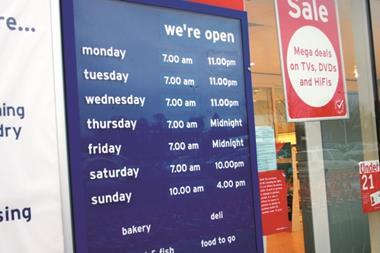Retailers have expressed outrage over “exceptional measures” introduced by Sainsbury’s that will allow more time in store for its customers on Sunday December 23.
Sainsbury’s stores will open an hour earlier than normal on December 23 for what is being called “browsing time” for customers, with no trading to take place during this period.
Its stores will close as normal but any customers still in the store at the time will be given a “reasonable time” to complete their shopping.
Londis retailer Steve Bassett was annoyed at the supermarket’s “stretching of the law”. “I know that the trading regulations won’t be breached but they’re stretching the law as far as it will go, especially by allowing an hour browsing at the start of the day and extra time at the end of the day,” he said.
Chris Pollard of Barlby Village Stores in Selby, North Yorkshire, agreed that the law was being stretched.
“It’s very cheeky what they’re doing and I question if customers will actually want to spend an hour browsing around a supermarket on a Sunday morning,” he said. “They’re working around the law to suit themselves.”
Sainsbury’s was keen to point out that the measures were not a breach of trading restrictions which prohibits stores over 3,000sq ft from opening for more than six hours on a Sunday.
“Traditionally December 23 is the busiest shopping day of the year,” a Sainsbury’s spokeswoman said. “Whilst there’s been no extension of trading hours for that Sunday, we’ll be doing everything we can to make sure our customers can get what they need including recruiting an extra 20,000 people.”
She also confirmed that these “exceptional measures” will only be in place for December 23 and not a permanent move.
Last month, Morrisons and Asda called for a temporary trading laws relaxation on December 23, similar to the eight-week period during the Olympic and Paralympic Games. The request was refused on the grounds that that new legislation would be required for another temporary suspension and that the government “has no further plans for a relaxation of the regulations”.






















6 Readers' comments